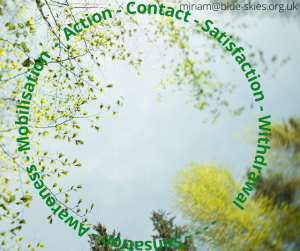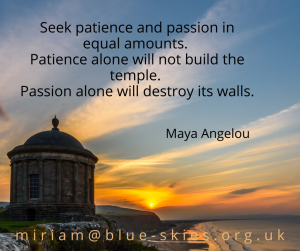
If you’ve experienced counselling or psychotherapy, you’ll be aware that there is an emphasis on expressing and allowing your true feelings to emerge. Repression of feelings can lead to long-term difficulties. So you might be surprised that Imogen and I will be discussing “inhibition“ as a useful practice.
The difficulty with repressed feelings is not so much the lack of expression, but the lack of awareness. By expressing and voicing our feelings in therapy with an affirming and supportive other, we can expand our emotional range and discover for ourselves what our feelings are and how we might choose to express them publicly. We can experiment with exaggerating and minimising until we find our own truth.
The inhibition we will be exploring on our workshop is about inhibiting automatic, unconscious responses, responses without awareness.
If you think back to the Gestalt Cycle the first phases in the Cycle of Awareness / Cycle of Needs / Gestalt Cycle are sensation and awareness. These two phases come before mobilisation, action and contact.

If mobilisation and action are based on automatic, knee-jerk responses, they are likely to be without awareness. They are likely to be attached to a fight / flight, stress arousal response, not to a more choiceful and integrated self.
In therapy we would spend time exploring all responses: Knee-jerk responses, irrational responses, and all the opposites, polarities and forms of expression.
When we are working with self-awareness (this is the topic for our first session of the workshop on Monday, June 7th) we need to inhibit the response that comes in nanoseconds, the quick response is likely to be the programmed, survival response. We inhibit that response (when it is safe to do so, of course) in order that we can spend a little bit longer with the sensations within, with our thoughts and awareness.
This is one of the central principles of our Body-Mind Workshops, the pause. The pause gives us a choice. The pause encourages awareness which is brought into our mobilisation and action.
I’m writing about it here but why don’t you come along to our workshop and try out some of the experiential exercises we teach around this? It makes so much more sense, at least to me, when we experience the difference rather than simply talking about it.
Experiment: pause right now.Just for a moment noticed your sensations. When you pause and focus and notice your sensations what happens? Do any thoughts arise from this? Might you do something different now to whatever it was you were going to do before you did this exercise?
